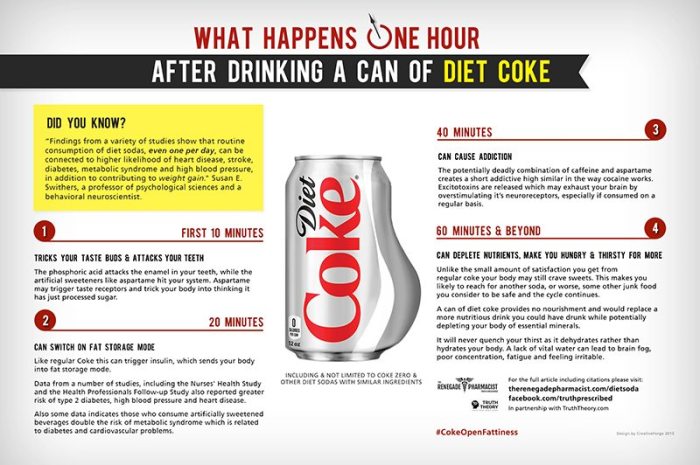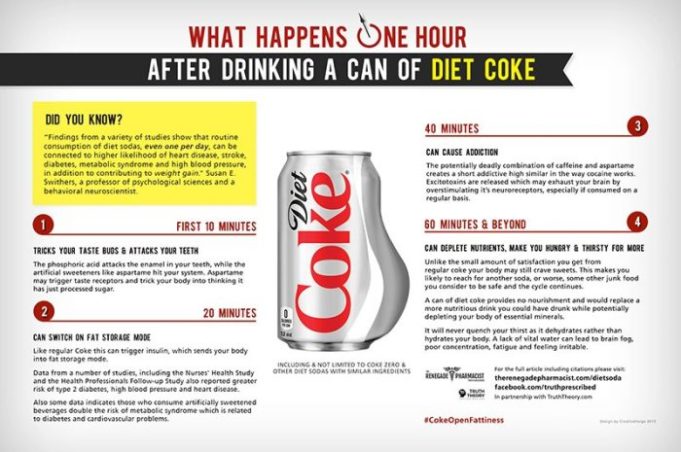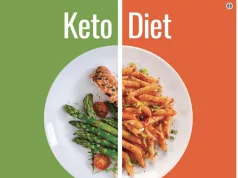Is Diet Coke good for weight loss? This question has sparked countless debates, with opinions ranging from fervent endorsements to strong warnings. While Diet Coke boasts zero calories, its impact on weight loss remains a complex topic. This exploration delves into the science behind Diet Coke’s potential effects on weight, examines its role in a balanced diet, and explores the broader health considerations associated with its consumption.
We’ll unpack the role of artificial sweeteners in Diet Coke, analyze studies investigating its link to weight loss, and discuss the potential health concerns associated with long-term consumption. We’ll also examine Diet Coke’s impact on hydration and explore the psychological factors that can influence its role in our eating habits.
Diet Coke and Calories: Is Diet Coke Good For Weight Loss
Diet Coke is a popular beverage choice for those looking to reduce their calorie intake. However, the question of whether it truly contributes to weight loss is a complex one. To understand the potential impact of Diet Coke on weight, it’s crucial to examine its calorie content compared to regular Coke.
Calorie Content
Diet Coke contains virtually no calories, while regular Coke is a calorie-dense beverage. One 12-ounce can of regular Coke contains approximately 140 calories, primarily from sugar. Diet Coke, on the other hand, utilizes artificial sweeteners to achieve its sweet taste without adding significant calories.
Diet Coke contains zero calories, while regular Coke contains 140 calories per 12-ounce can.
Impact on Calorie Intake
The difference in calorie content between Diet Coke and regular Coke can significantly impact overall calorie intake. Choosing Diet Coke over regular Coke can contribute to a calorie deficit, which is essential for weight loss. However, it’s important to remember that Diet Coke is not a magic bullet for weight loss.
Consuming Diet Coke instead of regular Coke can reduce calorie intake by 140 calories per serving.
Artificial Sweeteners and Calories
Diet Coke’s zero-calorie status is achieved through the use of artificial sweeteners. These sweeteners are designed to provide a sweet taste without adding significant calories. While artificial sweeteners are generally safe for consumption, some studies have suggested that they may influence appetite and food cravings.
Artificial sweeteners like aspartame and sucralose are used in Diet Coke to provide sweetness without adding calories.
Diet Coke and Weight Loss
While Diet Coke is often marketed as a calorie-free beverage, its impact on weight loss is a topic of ongoing debate. Understanding the potential effects of artificial sweeteners on metabolism and appetite, as well as the scientific evidence surrounding Diet Coke consumption and weight loss, can help you make informed decisions about your beverage choices.
Artificial Sweeteners and Metabolism
Artificial sweeteners are sugar substitutes that provide sweetness without calories. They are commonly found in diet sodas, including Diet Coke. The effects of artificial sweeteners on metabolism and appetite are complex and have been the subject of much research. Some studies suggest that artificial sweeteners may disrupt the body’s natural sugar regulation system, leading to increased cravings for sweet foods and potentially contributing to weight gain.
“Artificial sweeteners may disrupt the body’s natural sugar regulation system, leading to increased cravings for sweet foods and potentially contributing to weight gain.”
- Alterations in Gut Microbiota: Studies have shown that artificial sweeteners can alter the composition and function of the gut microbiota, which plays a crucial role in metabolism and appetite regulation. These changes may contribute to metabolic imbalances and increased cravings.
- Insulin Sensitivity: Some research suggests that artificial sweeteners may impair insulin sensitivity, making it harder for the body to regulate blood sugar levels. This can lead to increased hunger and cravings for sugary foods.
- Reward Pathways: Artificial sweeteners stimulate the brain’s reward pathways, similar to sugar, which may lead to increased cravings and difficulty controlling food intake.
Diet Coke and Weight Loss Studies, Is diet coke good for weight loss
Numerous studies have investigated the relationship between Diet Coke consumption and weight loss. While some studies have shown no association between Diet Coke consumption and weight gain, others have found mixed results. It’s important to note that many of these studies have limitations, such as relying on self-reported data or focusing on specific populations.
“Some studies have shown no association between Diet Coke consumption and weight gain, while others have found mixed results.”
- Longitudinal Studies: A 2015 study published in the American Journal of Clinical Nutrition followed over 60,000 adults for 10 years and found no association between diet soda consumption and weight gain. However, this study did not specifically focus on Diet Coke.
- Intervention Studies: Some intervention studies have shown that replacing sugary drinks with diet sodas can lead to modest weight loss. However, these studies often have short durations and may not reflect long-term effects.
- Meta-Analyses: Meta-analyses, which combine data from multiple studies, have yielded mixed results. Some meta-analyses have found no association between diet soda consumption and weight gain, while others have suggested a possible link.
Diet Soda in a Balanced Weight Loss Strategy
Diet Coke can be a part of a balanced weight loss strategy, but it’s not a magic bullet. While it can help reduce calorie intake, it’s crucial to consider its potential effects on metabolism and appetite.
- Moderate Consumption: Limiting your intake of diet soda, including Diet Coke, is essential. Excessive consumption may contribute to metabolic imbalances and cravings.
- Focus on Whole Foods: A healthy weight loss strategy should prioritize whole, unprocessed foods, such as fruits, vegetables, lean protein, and whole grains.
- Hydration: Water is the best beverage for hydration. Choose water over diet soda whenever possible.
- Mindful Eating: Pay attention to your hunger and fullness cues and eat when you’re truly hungry. Avoid mindless snacking or drinking diet soda to suppress hunger.
Diet Coke and Health Considerations
While Diet Coke is a calorie-free beverage, it’s important to consider its potential impact on health, particularly in the long term. The use of artificial sweeteners and other ingredients raises concerns about their effects on our bodies.
Artificial Sweeteners and Health
Artificial sweeteners are used to provide a sweet taste without adding calories. However, their long-term effects are still being investigated. Some studies have suggested potential health concerns associated with their consumption, including:
- Alteration in gut microbiota: Artificial sweeteners may disrupt the balance of bacteria in the gut, potentially affecting digestion and overall health.
- Increased risk of metabolic disorders: Some research suggests a possible link between artificial sweeteners and an increased risk of conditions like type 2 diabetes and metabolic syndrome.
- Changes in appetite and food cravings: Artificial sweeteners may trigger cravings for sugary foods, leading to increased calorie intake and potentially contributing to weight gain.
It’s important to note that these findings are still under investigation, and more research is needed to establish definitive conclusions. However, the potential risks associated with artificial sweeteners highlight the need for moderation in their consumption.
Diet Coke and Dental Health
Although Diet Coke is sugar-free, it can still contribute to dental problems. The acidity of Diet Coke can erode tooth enamel, increasing the risk of cavities and other dental issues.
The acidity of Diet Coke can erode tooth enamel, increasing the risk of cavities and other dental issues.
This is because the citric acid in Diet Coke can weaken tooth enamel, making it more susceptible to damage from bacteria. To minimize the impact of Diet Coke on dental health, it’s recommended to:
- Consume Diet Coke in moderation: Limiting the frequency and amount of Diet Coke consumption can reduce its impact on tooth enamel.
- Rinse your mouth with water after drinking Diet Coke: This helps neutralize the acidity and reduce the risk of enamel erosion.
- Practice good oral hygiene: Regular brushing and flossing are essential for maintaining good dental health, especially when consuming acidic beverages.
Diet Coke in a Healthy Diet and Lifestyle
Diet Coke can be part of a healthy diet and lifestyle, but it’s crucial to consume it in moderation.
- Focus on a balanced diet: A healthy diet should prioritize whole foods, fruits, vegetables, and lean proteins.
- Limit processed foods and sugary drinks: These contribute to weight gain, increased risk of chronic diseases, and poor dental health.
- Stay hydrated: Water is the best choice for hydration, and it’s essential for overall health.
- Engage in regular physical activity: Exercise is crucial for maintaining a healthy weight, improving cardiovascular health, and boosting mood.
While Diet Coke can be a substitute for sugary drinks, it’s important to remember that it’s not a magic solution for weight loss or overall health. A balanced diet, regular exercise, and healthy lifestyle choices are essential for achieving and maintaining good health.
Diet Coke Alternatives
If you’re looking for a refreshing beverage that won’t sabotage your weight loss goals, Diet Coke is a popular choice. However, there are plenty of other options available, each with its own set of pros and cons.
Diet Soda Comparison
Here’s a table comparing the calorie content and ingredients of various diet sodas:
| Beverage | Calories | Ingredients |
|—|—|—|
| Diet Coke | 0 | Carbonated water, caramel color, phosphoric acid, caffeine, aspartame, natural flavors, potassium benzoate (preserves freshness), citric acid, and phenylalanine |
| Diet Pepsi | 0 | Carbonated water, caramel color, phosphoric acid, caffeine, aspartame, natural flavors, potassium benzoate (preserves freshness), citric acid, and phenylalanine |
| Sprite Zero | 0 | Carbonated water, citric acid, natural flavors, caffeine, sodium benzoate (preserves freshness), potassium citrate, aspartame, and sucralose |
| Diet Dr Pepper | 0 | Carbonated water, caramel color, phosphoric acid, caffeine, aspartame, natural flavors, potassium benzoate (preserves freshness), citric acid, and phenylalanine |
| Diet Mountain Dew | 0 | Carbonated water, citric acid, caffeine, aspartame, natural flavors, sodium benzoate (preserves freshness), potassium citrate, and sucralose |
Alternative Beverages
Besides diet sodas, there are several other drinks you can enjoy as substitutes for Diet Coke:
* Water: The ultimate zero-calorie beverage, water is essential for hydration and overall health.
* Unsweetened Tea: Green tea, black tea, and herbal teas offer a range of flavors and potential health benefits.
* Sparkling Water: A great alternative to soda, sparkling water comes in various flavors and can be infused with fruits or herbs.
* Coffee: A morning pick-me-up, coffee can be enjoyed black or with low-calorie sweeteners.
* Fruit-Infused Water: Add slices of fruits like lemons, limes, oranges, or berries to your water for a refreshing twist.
Benefits and Drawbacks of Alternatives
Here’s a table showcasing the benefits and drawbacks of each alternative beverage:
| Beverage | Benefits | Drawbacks |
|—|—|—|
| Water | Zero calories, essential for hydration, promotes satiety | Can be bland, may not provide the same caffeine kick as other beverages |
| Unsweetened Tea | Antioxidant-rich, can promote heart health, can provide caffeine | May have a bitter taste, some varieties contain caffeine |
| Sparkling Water | Refreshing, low in calories, can be flavored | May contain artificial sweeteners, can be high in sodium |
| Coffee | Provides caffeine, can improve cognitive function, may reduce risk of certain diseases | Can cause anxiety or insomnia, may stain teeth |
| Fruit-Infused Water | Refreshing, provides electrolytes, can be customized with different fruits | May not be as satiating as other beverages, can add sugar |
Diet Coke and Hydration

Staying hydrated is crucial for weight loss and overall health. When you’re adequately hydrated, your body functions optimally, and you’re less likely to mistake thirst for hunger, leading to unnecessary calorie consumption.
Hydration and Weight Loss
Adequate hydration plays a significant role in weight loss. When you’re properly hydrated, your metabolism functions more efficiently, helping you burn calories at a faster rate. Water also helps to suppress appetite, making you feel fuller for longer, which can help you consume fewer calories overall.
Diet Coke’s Hydration Potential
While Diet Coke is calorie-free, it doesn’t contribute to your daily hydration needs like water does. This is because it’s a carbonated beverage, and the carbonation can have a diuretic effect, potentially leading to dehydration.
The Importance of Water Alongside Diet Soda
Even though Diet Coke is calorie-free, it’s essential to consume plenty of water alongside it to ensure you stay adequately hydrated. Water is the best source of hydration, and it’s crucial for your body’s overall functioning.
Drinking water alongside diet soda can help offset the potential dehydrating effects of the carbonation and ensure you’re getting enough fluids for optimal health.
Diet Coke and Psychological Factors
While diet soda may seem like a harmless alternative to regular soda, its impact on our psychology and eating habits can be significant. The absence of calories and sugar may lead to a false sense of control, potentially contributing to unhealthy food choices and cravings.
Diet Soda and Food Cravings
The connection between diet soda consumption and increased food cravings is a complex one. Some studies suggest that artificial sweeteners, like those found in diet soda, may disrupt the body’s natural reward system, leading to a desire for more sweet and sugary foods.
“Artificial sweeteners may alter the gut microbiome, which can influence cravings and food choices.”
This disruption may be due to the artificial sweeteners triggering the release of insulin, a hormone that regulates blood sugar levels, without providing any actual calories. This can lead to a feeling of deprivation and a subsequent craving for sugary foods.
Diet Soda and Unhealthy Eating Patterns
Diet soda consumption can contribute to the development of unhealthy eating patterns in several ways:
- Increased calorie intake: Despite being calorie-free, diet soda can lead to an increase in overall calorie intake. This is because the artificial sweeteners may trigger cravings for sugary and fatty foods, leading to overconsumption.
- Reduced satiety: The lack of calories and sugar in diet soda may not provide the same level of satiety as regular beverages, leading to increased hunger and a greater desire to eat.
- Disrupted hunger cues: The artificial sweeteners in diet soda can disrupt the body’s natural hunger and fullness signals, making it difficult to recognize true hunger and satiety.
These factors can create a cycle of overeating and unhealthy food choices, ultimately contributing to weight gain and other health problems.
Strategies for Managing Psychological Factors
It’s important to be mindful of the psychological impact of diet soda consumption and implement strategies to manage potential negative effects:
- Limit intake: Reducing or eliminating diet soda consumption can help break the cycle of cravings and unhealthy eating patterns.
- Focus on whole foods: Prioritizing a diet rich in fruits, vegetables, and whole grains can provide natural sweetness and satiety, reducing the need for artificial sweeteners.
- Stay hydrated: Drinking plenty of water throughout the day can help manage cravings and promote a sense of fullness.
- Mindful eating: Paying attention to hunger and fullness cues, and eating slowly and consciously, can help regulate food intake and reduce cravings.
- Seek professional help: If you struggle with food cravings or unhealthy eating patterns, seeking professional guidance from a registered dietitian or therapist can be beneficial.
Closure
Ultimately, the answer to whether Diet Coke is good for weight loss is nuanced and depends on individual circumstances. While it may offer a calorie-free alternative to sugary drinks, it’s crucial to consider the potential downsides and to prioritize a balanced diet and healthy lifestyle. By understanding the complexities of Diet Coke’s impact on weight and health, individuals can make informed choices that align with their overall well-being.
Quick FAQs
Is Diet Coke better than regular Coke for weight loss?
Yes, Diet Coke is better than regular Coke for weight loss due to its zero-calorie content. However, it’s important to note that diet soda consumption doesn’t guarantee weight loss.
Can Diet Coke affect my metabolism?
Research on the effects of artificial sweeteners on metabolism is ongoing. Some studies suggest potential negative impacts, while others show minimal effects. More research is needed to definitively understand the long-term effects.
Does Diet Coke cause cravings?
Some studies suggest that artificial sweeteners may trigger cravings for sweet foods. However, individual responses can vary.
Are there any alternatives to Diet Coke?
Yes, there are many alternatives to Diet Coke, including water, unsweetened tea, sparkling water, and unsweetened fruit-infused water. These alternatives offer hydration without artificial sweeteners.
While Diet Coke might seem like a good choice for weight loss due to its lack of calories, it’s important to remember that it doesn’t provide any nutritional value. Focusing on a balanced, clean diet plan rich in fruits, vegetables, and lean protein is a much more effective way to achieve your weight loss goals.
Remember, a healthy lifestyle includes not just what you drink, but also the overall quality of your food choices.
While Diet Coke is calorie-free, its impact on weight loss is debatable. Some studies suggest it might even hinder weight loss due to artificial sweeteners. If you’re looking for a sustainable approach to weight loss, especially if you have diabetes, focusing on a healthy diet is crucial.
A balanced diet rich in fruits, vegetables, and lean protein can help manage blood sugar levels and promote weight loss. For specific recommendations on the best diet to lose weight for diabetics , consulting with a healthcare professional is always recommended.
Remember, diet alone doesn’t guarantee weight loss, and regular exercise is essential for overall health and well-being.
Diet Coke is often touted as a weight-loss friendly beverage, but it’s important to remember that it’s still a processed drink with artificial sweeteners. While it may help curb cravings, a good diet is ultimately what contributes to sustainable weight loss.
To understand what constitutes a “good diet,” you can check out this resource: what is good diet. Ultimately, focusing on a balanced diet with plenty of fruits, vegetables, lean protein, and whole grains is more beneficial than relying on diet drinks alone.
























